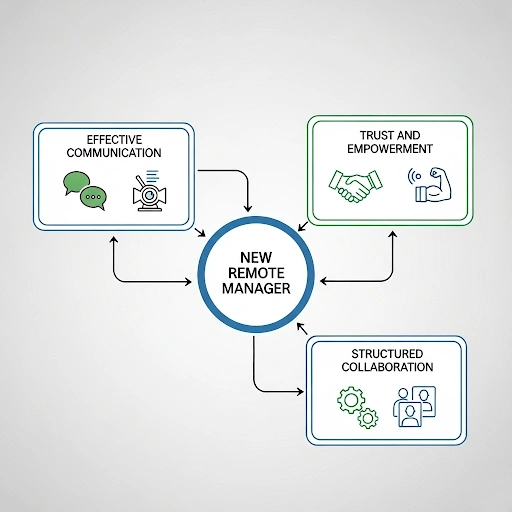- The New Frontier of Management
- What Is Remote Leadership and Why Is It Different?
- The Crucial Benefits of Developing Remote Leadership Skills
- Core Skills and Frameworks for Remote Leadership
- Real-Life Use Case: A Manager’s Remote Success Story
- Comparison: Essential Tools for Managing Remote Teams
- Common Mistakes to Avoid as a New Remote Manager
- Expert Tips and Best Practices for Remote Leadership
- FAQs: Your Top Remote Leadership Questions Answered
- A New Era of Empathetic Leadership
The New Frontier of Management
The global shift towards remote and hybrid work has fundamentally changed what it means to be a manager. Gone are the days of walking around the office to check on your team or holding impromptu in-person meetings. Today, effective leadership relies on intention and adaptability. For new managers navigating this landscape, developing strong remote leadership skills is essential. Building your remote leadership skills allows you to manage teams across distances, foster trust, and maintain engagement. By honing advanced remote leadership skills, you can guide your team successfully while mastering the unique challenges of virtual work. Understanding and practicing remote leadership skills is no longer optional—it’s the key to thriving in a professional world where proximity is no longer guaranteed.
We will explore the core pillars of effective remote management, highlighting essential remote leadership skills such as building trust across time zones, mastering asynchronous communication, and fostering team cohesion. Developing strong remote leadership skills helps you manage distributed teams effectively while keeping morale and productivity high. By applying practical remote leadership skills, you can create an engaged and supported team even in hybrid or fully remote settings. Understanding these remote leadership skills provides you with actionable strategies and real-world examples to become a confident and successful remote leader.
What Is Remote Leadership and Why Is It Different?
Remote leadership is the art of guiding, motivating, and supporting a team that is not physically co-located, and mastering remote leadership skills is essential for this. This distinct form of management relies heavily on digital communication, trust, and autonomy, requiring advanced remote leadership skills to navigate challenges effectively. The physical distance between team members brings unique obstacles, such as potential miscommunication, feelings of isolation, and difficulty monitoring progress, all of which test your remote leadership skills. A successful remote leader uses these remote leadership skills to act as a facilitator and coach, creating a culture of psychological safety and clear expectations where team members feel empowered to excel without constant oversight.
The relevance of remote leadership skills has grown tremendously in recent years. With a large portion of the global workforce operating remotely, the demand for managers with strong remote leadership skills has never been higher. Studies show that remote employees perform better and stay more engaged when their managers excel in remote leadership skills. This shift is permanent, making the mastery of remote leadership skills essential for managing remote teams effectively and ensuring professional success in 2025 and beyond.

The Crucial Benefits of Developing Remote Leadership Skills
Investing in your **remote leadership skills for new managers** yields a host of benefits that directly impact your team’s performance, well-being, and your own career trajectory. These advantages are the reason why so many organizations are now prioritizing training in this area.
Benefit 1: Increased Team Productivity and Efficiency
Effective remote leaders set clear goals and empower their teams to achieve them without constant check-ins. This autonomy fosters a sense of ownership and responsibility, leading to higher quality work and increased productivity. When team members are trusted to manage their own time and tasks, they often exceed expectations, as they can work during their most productive hours without the distractions of a traditional office environment.
Benefit 2: Higher Employee Morale and Retention
Feeling isolated is a significant risk for remote workers. A skilled remote leader combats this by fostering a strong team culture through virtual social events, open communication channels, and regular one-on-one check-ins. When employees feel connected and valued, their morale improves, leading to higher job satisfaction and lower turnover rates. This is a crucial element of how to **manage remote teams effectively** and is a key metric for long-term success.
Benefit 3: Enhanced Problem-Solving and Adaptability
Remote leadership requires a manager to be adaptable and innovative. The lack of in-person cues means you must learn to identify issues through different means, such as changes in communication patterns or project timelines. This forces you to think more strategically and to find creative solutions to problems, a skill set that is valuable in any professional setting. To delve deeper into communication strategies, check out our guide on The Guide to Effective Remote Communication.
Core Skills and Frameworks for Remote Leadership
Becoming an expert remote leader requires developing several key skills. These are not innate; they are learned and honed through practice. Here is a breakdown of the core competencies you must master.
Skill 1: Masterful Communication (Asynchronous and Synchronous)
Communication is the lifeblood of a remote team. It is essential to master both synchronous (real-time) and asynchronous (non-real-time) communication. Synchronous communication is for brainstorming, team building, and complex discussions. Asynchronous communication, which includes emails, project management comments, and shared documents, is for everything else. As a new manager, you must learn when to use each to avoid unnecessary meetings and to ensure clarity in all interactions. Providing concise, clear, and well-organized written instructions is a key component of this. This is one of the most vital **remote leadership skills for new managers** to develop.
Skill 2: Building and Sustaining Trust
Trust is the foundation of any successful remote team. Without the ability to see your team members working, you must trust that they are committed and capable. Building trust involves being transparent, empowering your team to make decisions, and focusing on outcomes rather than hours worked. It means trusting your team to do their jobs and providing them with the support they need to succeed. This reduces the need for micromanagement and allows your team to feel respected and valued.
Skill 3: Fostering Accountability and Setting Clear Expectations
In a remote environment, ambiguity is a killer. It is crucial to set clear, measurable goals and to define what success looks like for each project and role. Use project management tools to track progress and hold regular, brief check-ins to discuss any roadblocks. This creates a culture of accountability where everyone knows what is expected of them and can see their contribution to the team’s overall goals. It helps you **manage remote teams effectively** by providing a clear framework for success.
Skill 4: Demonstrating Empathy and Emotional Intelligence
Leading remotely requires a high degree of empathy. Your team members are dealing with distractions and stressors at home, and their mental health is paramount. Take the time to genuinely connect with them during one-on-one meetings. Ask about their well-being, not just their work. Recognizing and accommodating their unique situations shows that you care about them as people, which builds loyalty and makes them more likely to go the extra mile for you and the team. Showing empathy is a defining characteristic of a great remote leader.
Real-Life Use Case: A Manager’s Remote Success Story
Meet Sarah, a new manager at a software company. Her team was distributed across three different time zones, and she was nervous about the challenges. Instead of trying to replicate the office environment, she embraced the remote-first approach. She used a project management tool to create a single source of truth for all projects, with clear assignments and deadlines. She instituted a “no unnecessary meetings” policy, opting for asynchronous communication on Slack for most daily tasks. For team cohesion, she scheduled a weekly non-work-related virtual coffee chat where everyone could talk about their weekends and hobbies. She also made sure to have bi-weekly one-on-ones with each team member, where she focused on their professional development and personal well-being. By focusing on trust, clear expectations, and regular human connection, Sarah’s team consistently exceeded their performance targets. Her success story is a testament to the power of deliberate **remote leadership skills for new managers**.

Comparison: Essential Tools for Managing Remote Teams
Choosing the right technology is vital for a remote manager. Here is a brief comparison of three popular tools that can help you **manage remote teams effectively**.
| Tool | Pros | Cons | Best For… |
|---|---|---|---|
| Slack | Instant communication, great integrations, clear channels for topics. | Can be distracting and overwhelming with too many notifications. | Quick communication, team-wide announcements, and community building. |
| Microsoft Teams | Tightly integrated with Microsoft 365, robust video conferencing, shared documents. | User interface can be cluttered, less flexible than Slack for some integrations. | Organizations already using the Microsoft ecosystem, large enterprises. |
| Asana | Visual project management, clear task assignment and tracking, timeline views. | Less focused on real-time chat, requires team discipline to keep updated. | Project management, tracking long-term goals, and ensuring accountability. |
Common Mistakes to Avoid as a New Remote Manager
Even with the best intentions, new remote managers can fall into common traps. Recognizing these mistakes is the first step to avoiding them.
- Micromanagement: The temptation to constantly check on your team is strong. This shows a lack of trust and hurts morale. Solution: Focus on outcomes and results, not the hours logged.
- Assuming a Lack of Productivity: Remote work can sometimes be seen as “less work.” This is a harmful and often incorrect assumption. Solution: Base your evaluations on deliverables and project progress, not on visible activity.
- Over-scheduling Meetings: Moving all office meetings to video calls is a recipe for burnout. Solution: Use asynchronous communication for updates and only schedule meetings for collaboration and complex discussions.
- Neglecting Team Culture: Physical distance can lead to social isolation. Solution: Be intentional about building team rapport through non-work-related virtual events and open chat channels.
Expert Tips and Best Practices for Remote Leadership
These tips go beyond the basics and will help you become a truly exceptional remote leader.
- Prioritize Asynchronous Communication: Encourage your team to communicate primarily through written tools like Slack or email. This creates a searchable record and respects everyone’s time and focus. It’s a hallmark of mastering **remote leadership skills for new managers**.
- Set Clear ‘Office Hours’: For new managers and their teams, it’s easy for the lines between work and personal life to blur. Encourage your team to set clear working hours and to log off when their day is done. Lead by example.
- Encourage Proactive Communication: Teach your team to raise a red flag early if they are stuck or facing a challenge. This empowers them and prevents minor issues from becoming major setbacks.
- Invest in the Right Tools: A good project management tool, a reliable video conferencing platform, and a communication hub are non-negotiable. Don’t skimp on the technology that facilitates your team’s success.

FAQs: Your Top Remote Leadership Questions Answered
Q1: What is the most important skill for a remote manager to develop?
A: The single most important skill is trust. Without trust, you will be tempted to micromanage, which is the biggest reason remote teams fail. Trusting your team to be productive is the key to their success and yours.
Q2: How do I build rapport with my team when we can’t meet in person?
A: Schedule regular, non-work-related time to connect. This could be a virtual coffee break, a team game, or just a short time at the beginning of a meeting to check in personally. Consistency is key here.
Q3: How do I handle conflicts in a remote team?
A: Conflicts should be addressed immediately in a private, one-on-one video call. Avoid using public channels like Slack for sensitive discussions. Be an active listener and focus on finding a collaborative solution. For more insights on this, you can check out this article on How to Manage a Remote Team from a credible source like HBR.
Q4: How can I keep my team engaged and motivated remotely?
A: Acknowledge and celebrate their wins, no matter how small. Provide them with opportunities for professional growth and autonomy. Ensure they understand the impact of their work and feel a sense of purpose.
Q5: Should I track my employees’ activity with software?
A: It is generally not recommended. Employee monitoring software can damage trust and lead to a toxic work environment. Focus on clear goals and deliverables instead. If there is a performance issue, address it through direct, transparent communication, not surveillance.
A New Era of Empathetic Leadership
The journey to mastering remote leadership is ongoing, but it’s a rewarding one. Developing strong remote leadership skills—like trust, clear communication, empathy, and outcome-focused management—will help you thrive in a distributed environment and make you a more effective leader overall. By practicing essential remote leadership skills daily, you learn to connect with your team, empower them, and guide them toward success. Applying advanced remote leadership skills alongside strategic approaches allows you to navigate the complexities of managing virtual teams with confidence. Your effectiveness as a leader is now measured not by physical presence, but by how well your remote leadership skills enable collaboration, engagement, and achievement across your team.
To continue your journey into cloud security, consider the in-depth resources from the Cloud Security Alliance (CSA), a leading authority on cloud best practices. For more hands-on guides, check out our other posts on building a secure digital toolkit.
